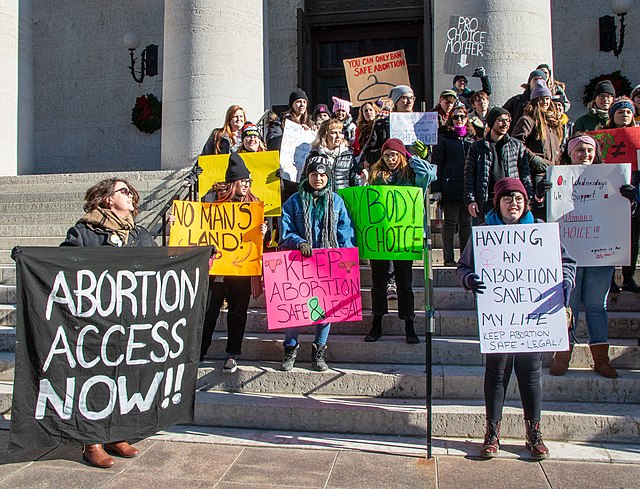Sharp: Texas’s extreme abortion ban will only put lives at risk
Becker1999 from Grove City, OH, CC BY 2.0, via Wikimedia Commons
As abortion access across the country is being threatened, Texas passes the most restrictive law yet.
September 17, 2021
Nearly 50 years ago, the U.S. Supreme Court ruled women have a constitutional right to choose whether to have an abortion without government restriction in the historic case of Roe v. Wade. Since then, several states passed legislation that would restrict abortion access, but those laws were all quickly shut down by the Supreme Court who ruled them unconstitutional; however, after almost 50 years of this established precedent, the Supreme Court is now letting the most extreme abortion ban in U.S. history go into effect.
Last week, Texas legislators passed the Texas Heartbeat Act. This law criminalizes abortions after cardiac activity has been detected, about six weeks into the pregnancy, with no exceptions in cases of rape or incest. This law also contains a provision that enlists private citizens to enforce the law and rewards at least $10,000 to anyone who successfully sues a person who assists someone seeking an abortion after the six week period. This provision effectively incentivizes abortion bounty hunters to report anyone seeking or aiding abortion access after six weeks.
Let me be clear: This law is not going to stop abortions; it will stop safe abortions. We’ve seen historically that abortion bans don’t work. If a person doesn’t want to carry out a full-term pregnancy, then they will find a way to get an abortion; however, they will become much more unsafe if access is restricted like this. Before Roe v. Wade, hospitals were filled with patients experiencing sepsis from unsafe or self-induced abortions. There’s a reason why a pro-choice advocate’s protest sign of choice is a coat hanger. That is our future if we continue to allow restrictions on safe abortion access, and it will disproportionately impact people in marginalized communities who can’t afford to go out-of-state for an abortion.
Nearly half of all pregnancies are unplanned, and the cutoff for abortion access according to this bill occurs before most people even realize that they’re pregnant, especially if it isn’t anticipated. Six weeks into pregnancy is just a mere two weeks after a woman’s first missed period. It is incredibly unethical to tell women that they have to go through a full-term pregnancy simply because they didn’t realize that they were pregnant yet.
Instead of focusing on banning abortions, we should instead be focusing on ways to lower the rate of unwanted or unplanned pregnancies. Developing better birth control options, providing cheaper and easier access to birth control and requiring comprehensive sex education in schools are all methods that will reduce unwanted pregnancies.
Roe v. Wade decided a woman’s right to choose whether to have an abortion is her constitutional right under the 14th Amendment of the U.S. Constitution. People deserve the right to choose what they do with their own bodies, and that includes making the decision to carry out a full-term pregnancy. I understand if you don’t like abortions, and I understand if they make you sad or upset, but banning abortions and taking away a woman’s right to choose is not the way to lower abortion rates; it will only put women’s lives at risk.









